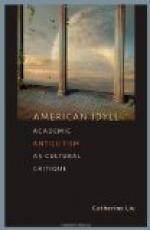We had a little swimming-tank in back, for the boys.
And then, most wonderful of all, came the day when the June-Bug was born, the daughter who was to be the very light of her adoring father’s eyes. (Her real name is Alice Lee.) “Mother, there never really was such a baby, was there?” he would ask ten times a day. She was not born up on the hill; but in ten days we were back from the hospital and out day and night through that glorious July, on some one of the porches overlooking the bay and the hills. And we added our adored Nurse Balch as a friend of the family forever.
I always think of Nurse Balch as the person who more than any other, perhaps, understood to some degree just what happiness filled our lives day in and day out. No one assumes anything before a trained nurse—they are around too constantly for that. They see the misery in homes, they see what joy there is. And Nurse Balch saw, because she was around practically all the time for six weeks, that there was nothing but joy every minute of the day in our home. I do not know how I can make people understand, who are used to just ordinary happiness, what sort of a life Carl and I led. It was not just that we got along. It was an active, not a passive state. There was never a home-coming, say at lunch-time, that did not seem an event—when our curve of happiness abruptly rose. Meals were joyous occasions always; perhaps too scant attention paid to the manners of the young, but much gurglings, and “Tell some more, daddy,” and always detailed accounts of every little happening during the last few hours of separation.
Then there was ever the difficulty of good-byes, though it meant only for a few hours, until supper. And at supper-time he would come up the front stairs, I waiting for him at the top, perhaps limping. That was his little joke—we had many little family jokes. Limping meant that I was to look in every pocket until I unearthed a bag of peanut candy. Usually he was laden with bundles—provisions, shoes from the cobbler, a tennis-racket restrung, and an armful of books. After greetings, always the question, “How’s my June-Bug?” and a family procession upstairs to peer over a crib at a fat gurgler. And “Mother, there never really was such a baby, was there?” No, nor such a father.
It was that first summer back in Berkeley, the year before the June-Bug was born, when Carl was teaching in Summer School, that we had our definite enthusiasm over labor-psychology aroused. Will Ogburn, who was also teaching at Summer School that year, and whose lectures I attended, introduced us to Hart’s “Psychology of Insanity,” several books by Freud, McDougall’s “Social Psychology,” etc. I remember Carl’s seminar the following spring—his last seminar at the University of California. He had started with nine seminar students three years before; now there were thirty-three. They were all such a superior picked lot, some seniors, mostly graduates, that he felt there was no one he could ask to stay out. I visited it all the term, and I am sure that nowhere else on the campus could quite such heated and excited discussions have been heard—Carl simply sitting at the head of the table, directing here, leading there.




